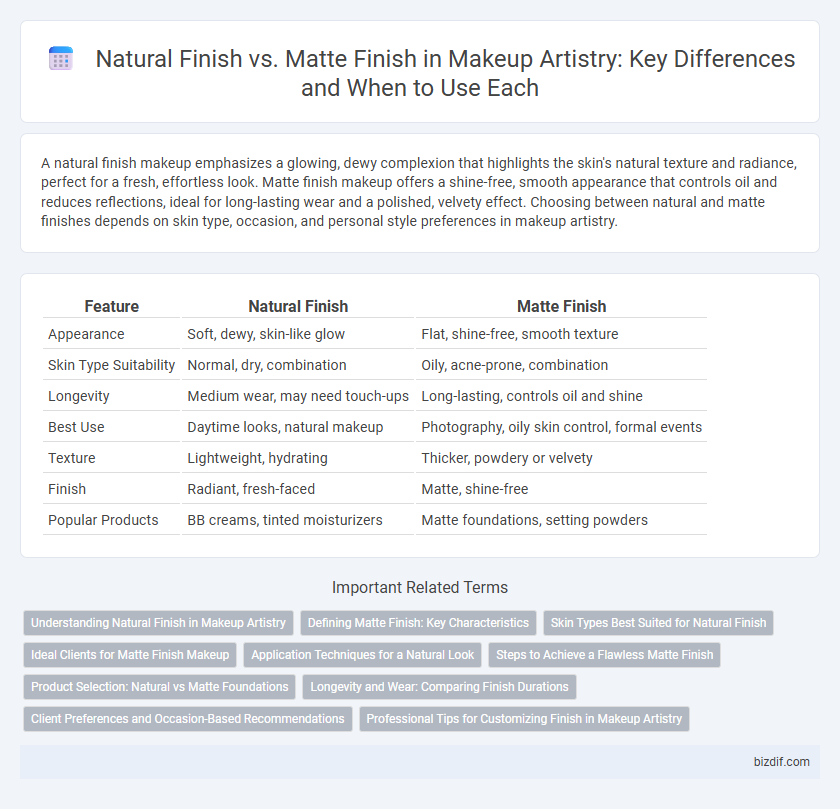A natural finish makeup emphasizes a glowing, dewy complexion that highlights the skin's natural texture and radiance, perfect for a fresh, effortless look. Matte finish makeup offers a shine-free, smooth appearance that controls oil and reduces reflections, ideal for long-lasting wear and a polished, velvety effect. Choosing between natural and matte finishes depends on skin type, occasion, and personal style preferences in makeup artistry.
Table of Comparison
| Feature | Natural Finish | Matte Finish |
|---|---|---|
| Appearance | Soft, dewy, skin-like glow | Flat, shine-free, smooth texture |
| Skin Type Suitability | Normal, dry, combination | Oily, acne-prone, combination |
| Longevity | Medium wear, may need touch-ups | Long-lasting, controls oil and shine |
| Best Use | Daytime looks, natural makeup | Photography, oily skin control, formal events |
| Texture | Lightweight, hydrating | Thicker, powdery or velvety |
| Finish | Radiant, fresh-faced | Matte, shine-free |
| Popular Products | BB creams, tinted moisturizers | Matte foundations, setting powders |
Understanding Natural Finish in Makeup Artistry
Natural finish makeup enhances the skin's appearance by providing a subtle, dewy glow that mimics healthy, hydrated skin. This technique emphasizes lightweight formulas such as tinted moisturizers and sheer foundations, ensuring the complexion looks fresh and radiant without heavy coverage. Understanding natural finish is crucial for makeup artists aiming to create versatile looks that suit everyday wear and photography.
Defining Matte Finish: Key Characteristics
Matte finish in makeup artistry is characterized by its non-reflective, shine-free surface that provides a smooth, velvety texture, ideal for oily and combination skin types. It absorbs excess oil, minimizes the appearance of pores, and offers long-lasting wear without the need for frequent touch-ups. This finish creates a sophisticated, polished look that emphasizes a flawless complexion without the glow typically associated with dewy or natural finishes.
Skin Types Best Suited for Natural Finish
Natural finish makeup is ideal for dry to normal skin types because it enhances the skin's natural glow without emphasizing dryness or texture. It provides a luminous, dewy look that helps hydrate and illuminate the face, making it perfect for those with dull or dehydrated skin. This finish allows for a lightweight application that maintains a fresh, radiant appearance throughout the day.
Ideal Clients for Matte Finish Makeup
Ideal clients for matte finish makeup typically have oily or combination skin types, as the formula helps absorb excess sebum and reduce shine throughout the day. Clients seeking long-lasting wear for events, photoshoots, or hot climates benefit from the smooth, shine-free appearance that matte finishes provide. Those preferring a sophisticated, velvety look without reflective properties often choose matte products to achieve a polished, natural effect.
Application Techniques for a Natural Look
Achieving a natural finish in makeup artistry involves using lightweight, sheer foundation applied with a damp beauty sponge for seamless blending and avoiding heavy powder to maintain skin's natural luminosity. For matte finishes, application requires precise layering with a dense brush or sponge, focusing on oil-prone areas and setting with translucent powder to control shine. Emphasizing gentle, stippling motions rather than heavy strokes ensures a more natural, airbrushed appearance even with matte products.
Steps to Achieve a Flawless Matte Finish
To achieve a flawless matte finish, begin by prepping the skin with a mattifying primer that controls oil and minimizes pores. Apply an oil-free, matte foundation using a damp sponge or brush for even coverage, then set with a translucent matte powder, concentrating on the T-zone. Finish by lightly dusting a matte setting spray to lock the makeup in place and reduce shine throughout the day.
Product Selection: Natural vs Matte Foundations
Natural finish foundations provide a dewy, radiant look that mimics healthy skin, making them ideal for dry or mature skin types. Matte foundations absorb excess oil and reduce shine, creating a smooth, shine-free complexion perfect for oily or combination skin. Selecting the right foundation finish enhances skin texture and longevity while complementing individual skin needs and desired makeup style.
Longevity and Wear: Comparing Finish Durations
Natural finish foundations typically offer moderate longevity with a radiant, skin-like appearance that adapts to skin oils over time, making them ideal for daily wear. Matte finish products excel in durability, providing a shine-free look that resists oil and perspiration, lasting longer in humid or oily conditions. For extended wear, matte finishes maintain a consistent texture, while natural finishes may require occasional touch-ups to preserve their dewy effect.
Client Preferences and Occasion-Based Recommendations
Natural finish makeup enhances the skin's radiance with a subtle glow, ideal for daytime events and clients seeking a fresh, dewy look. Matte finish makeup minimizes shine and controls oil, making it perfect for oily skin types, long-lasting wear, and formal occasions like weddings or photoshoots. Client preferences should guide the choice, considering factors such as skin type, desired longevity, and the specific occasion's lighting and ambiance.
Professional Tips for Customizing Finish in Makeup Artistry
Achieving the ideal makeup finish requires understanding client skin types and desired looks; natural finish suits dry or mature skin by enhancing luminosity, while matte finish controls oil and shine for combination or oily skin. Professional makeup artists customize finishes by layering lightweight, hydrating primers under natural finish foundations or using mattifying products and setting powders for matte effects. Tailoring application techniques, such as using damp sponges for dewy textures or stippling brushes for full matte coverage, ensures a personalized and flawless result.
Natural finish vs Matte finish Infographic

 bizdif.com
bizdif.com